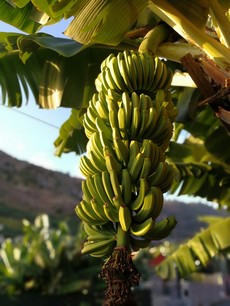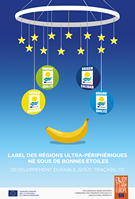Before the creation of a single market in 1993, “there wasn’t such a protection of the French market yet. Traditionally and for political reasons, General de Gaulle had attached great importance to the bananas from the French Caribbean and from Africa. Then, following the decolonization and the construction of the EU, markets and international policies evolved, preventing such protectionism from flourishing,” explains Karym Bagoee, coordinator of the Exotic Taste of Europe campaign for the UGPBAN GESBA consortium, ASPROCAN which promotes the quality label RUP (Outermost Regions).
Karym Bagoee, Domingo Martin Ortega and Javier Carmona Pradal at Fruit Logistica
The collapse of customs barriers threatens the territories
As a result, the banana sectors in Europe were confronted with a strong international competition. Customs barriers were then put in place for foreign products entering Europe in order to allow for a fair competition.
“Today however, those barriers are collapsing. Our products are therefore on the same market but not on equal footing. Our productions meet European standards, which are very high. The European regulation is indeed very demanding for producers, which is of course a very good thing, but without customs barriers, we are faced with a banana sector from abroad that does not follow the same social, environmental and sanitary regulations.
The real struggle lies there. We are not trying to cover the European market which currently imports more than 6 million tons of bananas each year, while the outermost regions produce 700,000 tons, but we would like our quality products to maintain their position on the market,” explains Karym. “And in order to protect our production and our model, we would like to remind consumers of the concrete benefits we generate in the territories. The importance of our productions for the balance in the rural life is undeniable. Our European banana productions are organized in small family farms of 1 to 13 ha on average, with a lot of permanent contracts -up to 90%-, which is 1 worker/ha! Despite the production costs, the evolution of our production methods and the work of our technical institutes guarantee a sustainable banana production and the development of biodiversity.”
The Marité - common thread of the Exotic Taste of Europe campaign
Exotic Taste of Europe: awareness campaign for the outermost region labels
The Exotic Taste of Europe is one of the co-financed campaigns in which the agricultural sectors of the outermost regions can promote themselves. Since 2005, these funds have helped developing a real culture of communication around the Banana of the Guadeloupe and Martinique for example. The European funds are a huge help to promote the European bananas with outermost region labels, when only 3 of the 28 member states of the European Union have outermost regions (France, Spain and Portugal).
“Since 2017 and for three years, we have been campaigning via the European program for the promotion of agricultural products with outermost region labels and the European banana. ‘Exotic Taste of Europe’ aims at promoting this European banana, along with a few other products with the outermost region label,” explains Karym. “The common thread of our campaign is the magnificent Marité, a historical three-mast ship and true European symbol. It displays the campaign colors and houses the Exotic Taste of Europe exhibition. During the three years of the campaign, it is expected at 18 different harbors in 6 European countries, namely France, Spain, Portugal, Germany, Belgium and Poland.”
Children at the heart of the awareness campaign
In each harbor, an educational project is set up with the schools. “Children can visit the ship. They learn about Europe, labeling and quality principles, they are given educational kits and a small snack. More than 35,000 people have already visited the ship. We have distributed tens of thousands of kits to schools. We have also raised awareness in the streets at each stop by handing out flyers and thanks to our street photo exhibitions on agricultural farming in the outermost regions. This year, we are also attending some fairs.”
Banana cultivation: A true social model in the territories
This campaign informs consumers about the quality of agricultural products beyond continental Europe. It also aims at raising awareness by making us realize that we, as Europeans, have the power to protect the sectors in the territories by consuming their products.
“In some towns in the north of the Martinique, the banana sector provides for 1 out of 2 inhabitants. If it was to disappear, 50% of the population would lose their jobs.
All European banana productions included (Guadeloupe, Martinique, Canaries and Madeira), this represents 30,000 jobs in total that must be protected. In some European territories, the agricultural practices are still traditional, family-based and organized in cooperatives, which brings a balance in the local rural life.
It is not just about selling bananas, but it is truly a way of life, a social model. Besides, the producers show a real desire to protect the environment and biodiversity, especially with the Sustainable Banana Plan for example (article here), which even exceeds the European legislation requirements. We have adopted an approach that strives for excellence and fights for preservation. Now, we are waiting to see if this popular discourse will actually translate into a consumption that reflects such a conviction,” concludes Karym.
For more information: 
Karym Bagoee
Phone: +33 (0)1 56 70 01 93
Mobile: +33 (0)7 78 20 57 27
[email protected]
https://www.exotictasteofeurope.eu/










